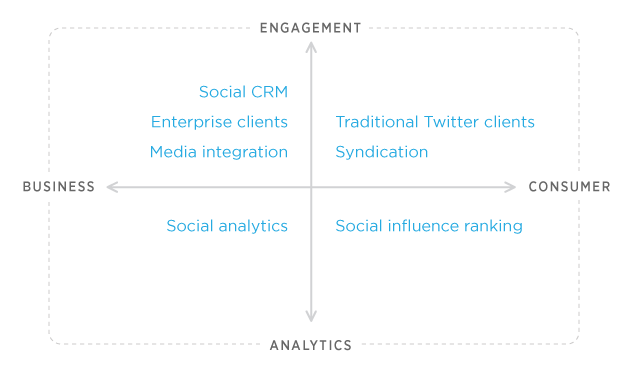Bigger Than Twitter
Yes, I too have thoughts about Twitter’s recent announcement. But first…
Recap (Skip Ahead If You’ve Heard This One Before)
On Thursday, Twitter pissed of what seems to be every single blog I read when Director of Consumer Product Michael Sippey published a detailed list of changes coming to the site’s API.
For some context, here’s the chart Twitter used to explain the changes.

Twitter Dev Chart
And the offending passage:
That upper-right quadrant also includes, of course, “traditional” Twitter clients like Tweetbot and Echofon. Nearly eighteen months ago, we gave developers guidance that they should not build client apps that mimic or reproduce the mainstream Twitter consumer client experience." [sic] And to reiterate what I wrote in my last post, that guidance continues to apply today.
Translation: if you should maybe slip on some ice and fall off a bridge, don’t say we didn’t warn you.
Smart People Said Things
Folks who are much smarter than me had a lot to say about Sippey’s post.
{% blockquote -John Gruber http://daringfireball.net/linked/2012/08/16/twitter-drop-dead Daring Fireball %} So Klout, which is utter vainglorious masturbatory nonsense, that’s OK. But services like Storify and Favstar, which are actually useful and/or fun, those are no good. And don’t even get me started on Twitter turning against client apps. For chrissake Twitter’s own app started life as a third-party client. {% endblockquote %}
{% blockquote -Shawn Blanc http://shawnblanc.net/2012/08/twitter-2/ Twitter, Advertisers, Users, and Third-party Devs (in that order) %} What is sad is that as long-time and active users, we’re given no choice in the matter. We must suffer the official clients and we must suffer ads. {% endblockquote %}
{% blockquote -Ben Brooks http://brooksreview.net/2012/08/twitter-bullshit/ Twitter’s API Changes %} Twitter has stopped caring about the users that made the service popular, and started only to care about the users that can draw in more users. {% endblockquote %}
{% blockquote -Marco Arment http://www.marco.org/2012/08/16/twitter-api-changes Interpreting some of Twitter’s API changes %} I sure as hell wouldn’t build a business on Twitter, and I don’t think I’ll even build any nontrivial features on it anymore. {% endblockquote %}
What to Make of All This?
I like to think of my time writing on the Internet in two separate eras: before I joined Twitter and after. There is no question that the service changed my exposure online. It has helped me reach a wider audience, gotten me in touch with some really smart people and helped me connect with folks who have turned out to be friends and sometime collaborators. So I care deeply about where Twitter is going and what it can (continue to) do for me.
But there are a few things that I need to try to remember:
- Twitter doesn’t care about me.
- Past is past.
- We (readers, writers, voyeurs, everyone) are bigger than Twitter.
We’ve all become dependent on what Twitter once was. Even adding “tweet,” both in its verb and noun forms, to the lexicon now seems like a foolhardy move. As much as we want it to be that thing we used to love, Twitter remains a private company that can do whatever the hell it wants. While so many are decrying the fact that Twitter is effectively screwing the users that made it what it is, I can’t help but think, “So what? Isn’t that what companies do?”
Twitter has a storied history of third-party innovation. Craig Hockenberry, maker of Twitterrific, which was an iPhone app even before there was an App Store, details all of the firsts his app contributed to the service. And just like Gruber pointed out, Twitter’s first native iPhone app started out as a third-party client. Tweetie, which the company bought to get into the app game, was a revolutionary take on what a Twitter client could do. However, today’s Twitter app bears almost no resemblance to Tweetie. Once upon a time it represented everything Twitter wanted to be, but that’s no longer true. We can’t change that. The idea that Twitter owes developers anything is a non-starter. It sucks, but they don’t.
Which brings the conversation back to us. We are all bigger than Twitter. I like to think that we are bigger than social media, period. The way I view my history of writing online is problematic. Maybe I have become too reliant on these things that I don’t own. But I own this site. The web, it seems, is where the conversation is happening. Twitter and Facebook and Reddit and everything in between are simply ways to navigate the massive amounts of content floating around in the ether.
Other services will come along1 and most of them will probably fail. Maybe Twitter was a once in a lifetime innovation; maybe nothing will come close to being as great as it once was.2 Either way, we’ll all still be here, online, writing and sharing and commenting away. At least, that’s the plan.